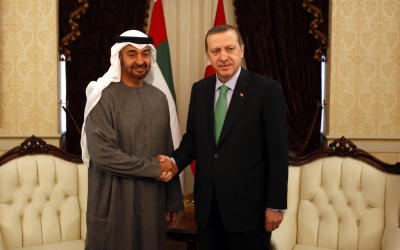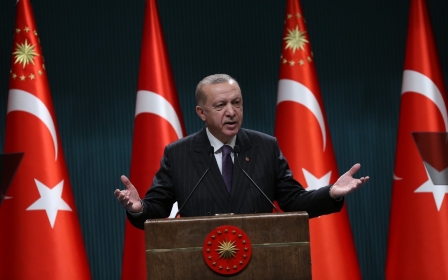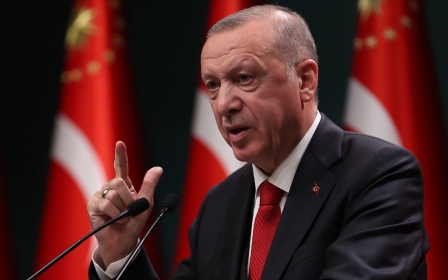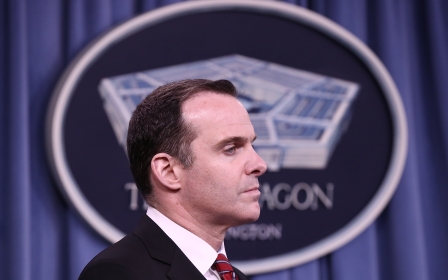Biden cold shoulders Erdogan as request for call left unanswered
With just seven days until Joe Biden assumes office, the US president-elect is yet to respond to Turkish President Recep Tayyip Erdogan's offer of a phone call, an unusual snub for a powerful Nato ally.
Three people familiar with the issue told Middle East Eye that Erdogan's office requested a call with Biden last month, but weeks later no conversation has been arranged.
Biden’s decision not to pick up the phone is hardly surprising considering his remarks last year to the New York Times, in which he said that Washington should take a different approach towards Erdogan and support the Turkish opposition.
Erdogan also wasn’t particularly quick to congratulate Biden on his 3 November election victory, as Ankara was mindful of its warm relations with the Trump administration. The Turkish president was one the last world leaders to do so, in a message sent in November.
Both Biden’s transition team and the Turkish presidency have avoided giving MEE direct answers to queries on the issue.
A spokesperson for Biden said that his team would continue to read out any congratulatory calls the president-elect takes part in. “Beyond that we’ll decline to comment,” the spokesperson said.
Likewise, a spokesperson for the Turkish presidency said his office would release a readout if Erdogan had a phone call with Biden.
Beyond the phone call issue, Turkish officials in Ankara have publicly said that they are willing to establish a constructive relationship with the new administration.
Ibrahim Kalin, the chief adviser and the spokesperson for Erdogan, told Turkish TV on Sunday that Ankara’s contacts with the transition team so far were “very positive”.
“They say they want to develop good relations with Turkey and turn a new page,” Kalin added.
However, reluctance to talk to Erdogan, while calling up all the leaders of major allies, from South Korea to Australia to New Zealand, suggests Biden won't be quick to turn a page with the Turkish government.
“Everyone understands the importance of Turkey for this part of the world, and the Biden administration, too, will seek to have a problem-free relationship with Ankara,” Asli Aydintasbas, a senior policy fellow at the European Council on Foreign Relations (ECFR), told MEE. “But there are outstanding issues and a toxic narrative in bilateral ties.”
Aydintasbas said the new administration’s first instinct will be to have a little distance in the relationship: “Neither uphold Turkey as a model for the region nor target Turkey as a geopolitical troublemaker. Just neutrality and distance.”
Biden and Erdogan’s personal history goes back to 2011, when the then-vice president paid a visit to Erdogan in his personal residence after he had undergone surgery.
On many occasions during the Obama presidency, Biden played the role of interlocutor, channelling Erdogan’s frustrations to the administration over the years, and their friendship got closer.
'Everyone understands the importance of Turkey for this part of the world, and the Biden administration, too, will seek to have a problem-free relationship with Ankara'
- Asli Aydintasbas, analyst
However, towards the end of the administration, Biden twice had to apologise to Erdogan for angering the Turkish president.
In 2014, Biden blamed Turkey and the UAE for strengthening the Islamic State group through their policies, particularly highlighting Ankara’s failure to seal the border to prevent the flow of foreign fighters in Syria. An angry Erdogan said in response that Biden should apologise or he would become “history to him”. And the vice president followed through.
Then in 2016, after the coup attempt in Ankara, Biden visited Erdogan and publicly apologised for not making a trip sooner and showing support for the Turkish government.
But Biden's warm and conciliatory sentiments began to change out of office, particularly when Turkey staged an offensive in October 2019 against US-backed Kurds in Syria.
“Turkey is the real problem here,” Biden said at the time, during a televised Democratic Party debate. “And I would be having a real lockdown conversation with Erdogan and letting him know that he's going to pay a heavy price for what he has done now. Pay that price.”
Turkish officials are well aware that the Biden administration will be quite different to Trump's in its regional policies.
Erdogan had already made a series of overtures towards Israel, the European Union, Saudi Arabia and Greece to make room for manoeuvre, ahead of Biden's swearing in on Wednesday.
Middle East Eye delivers independent and unrivalled coverage and analysis of the Middle East, North Africa and beyond. To learn more about republishing this content and the associated fees, please fill out this form. More about MEE can be found here.





